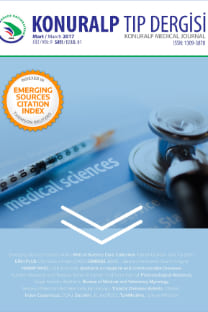Doğum Sonrası Psikoz
Postpartum psikoz, doğum sonrası dönemde ortaya çıkan psikiyatrik bozuklukların en şiddetlilerindendir. Doğum sonrası dönemde %0.1–0.2 oranında görülebilmektedir. Doğumdan sonraki 3–14. günlerde görülmekle birlikte %80’inde belirtiler ilk bir ay içinde ortaya çıkmaktadır. Ailede psikiyatrik hastalık öyküsü olanlarda risk daha fazladır. Gençlerde, primiparlarda ve daha önce ruhsal bozukluk öyküsü olanlarda daha sık görülmektedir. Doğum sonrası östrojen ve progesteron konsantrasyonlarındaki ani düşmenin postpartum psikoz nedeni olabileceği ileri sürülmüştür. Kliniği yorgunluk uykusuzluk gibi belirtilerle başlayabilir. Sanrılar veya halüsinasyonlar gibi psikotik özellikler geliştirirse hasta bebeğe veya kendisine zarar verebilir. Postpartum depresyona oranla suisid düşüncesi ve girişimi ön plandadır. Suisid ve homisid riski nedeni ile hızla ve etkin bir biçimde tedavi edilmelidir. Elektrokonvülsif Terapi (EKT) alternatif tedavi seçeneği olabilir. antipsikotiklere
Anahtar Kelimeler:
Doğum Sonrası, Psikoz, Aile Hekimi
-
Postpartum psychosis is the one of the most severe psychiatric disorder that can be seen during postpartum period. It can be seen between 0.10.2 % ratios at postpartum period. It is generally seen in the first two weeks after delivery but in almost 80% of the cases can also be seen until the end of the first month. Risk increases for those who have a positive family history of psychiatric disorder. It is seen more often in primipars, young and those who have psychological disorder history before delivery. Abrupt decrease of serum concentrations of estrogen and progesterone after delivery is suggested in its etiology. Early symptoms of postpartum psychosis may be insomnia and fatigue. The patient may give harm to her baby or herself if develops psychotic features including delusions or hallucinations. Suicidal ideas and suicide attempts may be more prominent than they occur in postpartum depression. It should be treated immediately and effectively due to suicide or homicide risks. If it can not be treated with antipsychotic drugs then electroconvulsive therapy (EKT) can be an alternative treatment option. Ninety-five percent of the treated patients with postpartum psychosis recover usually in 2-3 months period. Health workers practicing in first step can play important roles in detection and early management of patients with postpartum psychosis
Keywords:
-,
___
- Gülseren L. Doğum Sonrası Depresyon. Türk Psikiyatri Dergisi 1999;10(1):58-67.
- Parry BL. Postpatum psychiatric syndromes. Comprehensive textbook of psychiatry, 6. baskı, cilt 1, Kaplan HI, Sadock BJ (ed), Baltimore: Williams & Wilkins, 1995; 1059-66.
- Sadock BJ, Sadock VA. Synopsis of psychiatry behavioral sciences/clinical psychiatry, 7.baskı, Baltimore: Lippincott Williams and Wilkins, 2003; 494-6.
- Wisner KL, Parry BL, Piontek CM. Clinical practice. Postpartum depression. N Engl J Med. 2002; 347(3):194-9.
- Akdeniz F, Gönül AS. Kadınlarda Üreme Olayları ile Depresyon İlişkisi. Klinik Psikiyatri 2004; Ek 2:70-4.
- Karamustafaoğlu N, Tomruk N Postpartum Hüzün ve Depresyonlar, Duygudurum Dizisi. 2000; 2:64-71.
- Eltutan H, Öncüoğlu C. Kadınlara özgü psikiyatrik bozukluklar. Depresyon Dergisi. 1997; 2(3): 74-80.
- Özkan S. Psikiyatrik tıp: Konsultasyon-liyezon psikiyatrisi. İstanbul: Roche Müstahzarları, 1993; 201-20.
- Erdem O, Bez Y. Doğum Sonrası Hüzün ve Doğum Sonrası Depresyon. Konuralp Tıp Dergisi 2009;1(1):32- 7.
- Unterman RR, Posner NA, Williams KN et al. Postpartum depressive disorders: Changing trends. Birth. 1990;17(3):131-7.
- Kendell RE, McGuire RJ, Connor Y et al. Mood changes in the first three weeks after childbirth. J Affect Disord. 1981;3(4):317-26.
- Askın R. Depresyon El Kitabı 2. baskı. Konya: Atlas Kitabevi, 1999; 100-22.
- Ahokas A, Aito M, Turiainen S. Association between estradiol and puerperal psychosis. Acta Psychiatr Scand. 2000;101(2):167-9.
- Balcıoğlu İ. Depresyonun Etiyopatolojisi, Depresyon, Somatizasyon ve Psikiyatrik Aciller Sempozyumu. 1999; 19-28.
- Akkaya C. Depresyon Etiyolojisinde Serotonin ve Noradrenalin, Yeni Symposium 2005; 43(3):91-96.
- Thome M. Predictors of postpartum depressive symptoms in Icelandic women. Arch Womens Ment Health. 2000; 3(1):7-14.
- Aydin N, Inandi T, Yigit A, Hodoglugil NN. Validation of the Turkish version of the Edinburgh Postnatal Depression Scale among women within their first postpartum year. Soc Psychiatry Psychiatr Epidemiol. 2004; 39(6):483-6.
- Honey KL, Bennett P, Morgan M. Predicting postnatal depression. J Affect Disord. 2003; 76(1-3):201-10.
- Noble RE. Depression in women. Metabolism Clinical and Experimental. 2005; 54(5 Suppl 1):49-52.
- Erdem ÖP. Bucaktepe PG, Özen Ş, Kara İH. Prepartum Ve Postpartum Dönemde Annelerin Depresyon ve Kaygı Düzeylerinin İncelenmesi. Düzce Tıp Dergisi 2010; 12(3): 24-31
- Erdem Ö, Bez Y. Doğum Sonrası Hüzün ve Doğum Sonrası Depresyon. Konuralp Tıp Dergisi 2009;1(1):32- 7.
- ISSN: 1309-3878
- Yayın Aralığı: Yılda 3 Sayı
- Başlangıç: 2009
- Yayıncı: Düzce Üniversitesi Tıp Fakültesi Aile Hekimliği AD adına Yrd.Doç.Dr.Cemil Işık Sönmez
Sayıdaki Diğer Makaleler
Nadiren El ve Ön Kolda Gözlenen Konjenital Arteriyovenöz Fistülün Radyolojik Bulguları
Spinal Tümör Cerrahisi sonrasında Gelişen Supratentoryal Kanama
Kolorektal Kanserlerde Serum Bakır, Çinko ve Seruloplazmin Oranlarının Prognostik Değerleri
Cansever Z, Ümmü Zeynep AVŞAR, Hamit ACEMOĞLU, Yasemin ÇAYIR, Ümit AVŞAR
Türkiye'de sporadik Parkinson Hastalığı Olan Hastalarda LRRK2 Geni G2019S Mutasyonunun Araştırılması
Ovaryan Hiperstimulasyon Sendromunun Ultrasonografik Özellikleri: Olgu Sunumu
